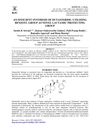Search
for
Sort by
Research
30-60 / 368 results
research The E211 G>A Androgen Receptor Polymorphism Is Associated With a Decreased Risk of Metastatic Prostate Cancer and Androgenetic Alopecia
E211 G>A gene linked to lower risk of severe prostate cancer and hair loss.

research 5α-Reductase Type 2 Gene Variant Associations with Prostate Cancer Risk, Circulating Hormone Levels, and Androgenetic Alopecia
A49T gene variant linked to higher prostate cancer risk, lower hormone levels, and slightly reduced balding risk.

research Pharmacology of Natural Volatiles and Essential Oils in Food, Therapy, and Disease Prophylaxis
Natural volatiles and essential oils have health benefits and can enhance the effects of some medicines, but more research is needed to understand how they work and their possible side effects.

research Relative Binding Affinity of Novel Steroids to Androgen Receptors in Hamster Prostate
New steroids were effective in blocking male hormone receptors in hamster prostates.

research An Efficient Synthesis of Dutasteride: Utilizing Benzoyl Group as Novel Lactamic Protecting Group
Researchers created a new, efficient way to make Dutasteride, a hair loss and prostate drug, with high purity using a benzoyl group.

research Microemulsion Formulation of Combination of Virgin Coconut Oil and Rice Bran Oil for Hair Growth
The combination of virgin coconut oil and rice bran oil in the FIII formula promoted hair growth effectively.

research Advances in Therapeutic Management of Complicated Demodicosis in Canines
Effective treatment with antiparasitic, antibacterial, anti-inflammatory, and antiallergic medications can lead to recovery in dogs with complicated demodicosis.

research Identifying Key Components and Therapeutic Targets of the Immune System in Hidradenitis Suppurativa with an Emphasis on Neutrophils
The article suggests that targeting specific immune pathways could help control and treat the skin disease hidradenitis suppurativa.

research Follicular Keratosis of the Chin Treated with 1.24R-Dihydroxyvitamin D3 Ointment
Vitamin D3 ointment improved skin bumps on the chin but didn't give lasting results after stopping use.

research Hirsutism and Virilization
Hirsutism is common body hair growth due to genetics and hormones, and while not a disease, it can be distressing; virilisation includes hirsutism with other male traits and needs medical attention.

research Distinct Transcriptional Profiles of the Female, Male, and Finasteride-Induced Feminized Male Anogenital Region in Rat Fetuses
Finasteride exposure affects gene expression and anogenital distance in male rat fetuses.

research The Association Between Exercise and Androgenetic Alopecia: A Survey-Based Study
More exercise might link to hair loss, but other factors also matter.

research Clinical Factors and Hair Care Practices Influencing Outcomes in Central Centrifugal Cicatricial Alopecia
Certain health conditions and hair care habits affect the treatment results for a scalp condition called Central Centrifugal Cicatricial Alopecia.

research Clinical Factors and Hair Care Practices Influencing Outcomes in Central Centrifugal Cicatricial Alopecia
Some factors like thyroid disease, diabetes treatment, hair dryers, natural hairstyles, and scalp conditions can affect the treatment results for a hair loss condition called CCCA.

research Improved Forensic Hair Evidence for Drugs of Abuse by Mass Spectrometry
Forensic hair analysis for drugs is now more reliable and accurate.

research Effect of Hizkia Fusiforme Okamura on the Proliferation of Dermal Papilla Cells
Hizkia fusiforme seaweed extract can help promote hair growth.

research 5α-Reductase Type 2 Gene Variant Associations with Prostate Cancer Risk, Circulating Hormone Levels, and Androgenetic Alopecia
Gene variant linked to prostate cancer, hormone levels, and hair loss.

research The Nuts and Bolts of Low-Level Laser Therapy
Low-level Laser Therapy may help reduce inflammation, pain, and aid healing, but more research is needed to confirm its effectiveness and establish standard treatment guidelines.

research Mucocutaneous Reactions to Chemotherapy
Chemotherapy can cause various skin reactions, with hair loss being the most common, and proper diagnosis and treatment of these reactions are important.

research SFRP2/DPP4 and FMO1/LSP1 Define Major Fibroblast Populations in Human Skin
Two main types of fibroblasts with unique functions and additional subtypes were identified in human skin.

research Biomaterials Functionalized with MSC Secreted Extracellular Vesicles and Soluble Factors for Tissue Regeneration
Biomaterials with MSC-derived substances could improve tissue repair and have advantages over direct cell therapy.

research Lecithin Organogels as a Potential Phospholipid-Structured System for Topical Drug Delivery: A Review
Lecithin organogels could be good for applying drugs to the skin because they are stable, safe, and can improve drug absorption.

research ATP-Dependent Chromatin Remodeling During Mammalian Development
ATP-dependent chromatin-remodeling complexes are crucial for gene regulation, cell differentiation, and organ development in mammals.

research Congenital Adrenal Hyperplasia: Current Insights in Pathophysiology, Diagnostics, and Management
Early diagnosis and individualized treatment improve outcomes for Congenital Adrenal Hyperplasia.

research The Pharmacology of Methotrexate
Methotrexate treats various disorders by inhibiting DNA synthesis, but careful monitoring is needed to avoid toxicity and manage side effects.

research Androgenetic Alopecia: A Review
Male pattern baldness involves genetics, hormones, and needs better treatments.

research Genetic Variation at the MC1R Locus and the Time Since Loss of Human Body Hair
Humans lost body hair relatively recently in evolution.

research K ATP Channels and Cardiovascular Disease
K_ATP channel gene mutations are linked to heart diseases, but more research is needed to understand the connection and treatment potential.

research Historical and Current Adenosine Receptor Agonists in Preclinical and Clinical Development
The document concludes that adenosine receptor agonists have potential for treating various conditions, but only a few are approved due to challenges like side effects and the need for selective activation.